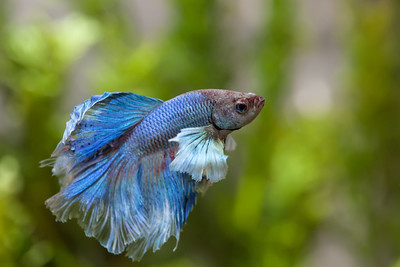Table of Contents
If you’re a betta fish owner, you may be wondering if your fish needs darkness to sleep. While it’s common knowledge that humans need darkness to sleep, the same isn’t necessarily true for all animals. In this article, we’ll explore whether or not betta fish need darkness to sleep, and what factors may affect their sleeping habits.
Betta fish are known for their vibrant colors and long, flowing fins. They’re also known for their unique behaviors, such as building bubble nests and flaring their gills. But what about their sleeping habits? While it’s true that betta fish do rest, it’s unclear whether or not they need darkness to do so. In the following paragraphs, we’ll dive deeper into this topic and provide some insight into how you can ensure your betta fish is getting the rest it needs.
Understanding Betta Fish Sleep
Betta fish, like all living creatures, need sleep to stay healthy and normal. However, their sleeping habits are different from those of humans and other animals. Understanding the sleep-wake cycle of betta fish can help you ensure that your pet is healthy and happy.
Betta fish do not have eyelids to close, so it may be difficult to tell when they are sleeping. However, a sleeping betta fish will be less active and may rest at the bottom or top of the tank. They may also be less responsive to movement or noise.
Betta fish need darkness to sleep, but they do not need complete darkness. A small amount of light is necessary for them to see their surroundings and feel secure. You can use a low-wattage bulb or a night light to provide enough light for your betta fish to sleep comfortably.
Restlessness or reduced activity during the day may be a sign that your betta is not getting enough sleep at night. If your betta fish seems lethargic or is sleeping more than usual, it may be a sign of illness or stress. You should monitor your betta’s sleeping habits and activity level to ensure that they are healthy and normal.
Do Betta Fish Need Darkness to Sleep?
Betta fish, like most other fish, do not have eyelids to close. This means that they do not have a way to block out light, making it difficult for them to sleep. However, they do need a period of darkness to rest and recharge.
While it is not necessary for betta fish to have complete darkness to sleep, a darker environment can help them feel more secure and relaxed. This is because betta fish are naturally found in shaded areas in the wild, such as under leaves or in crevices.
Providing a mix of light and dark in the tank can help mimic their natural environment. This can be achieved by using a timer to turn off the tank lights at night and using a dimmer light during the day.
It is important to note that betta fish do not have a specific sleep cycle like humans do. They may rest intermittently throughout the day and night, rather than sleeping for a continuous period of time.
The Role of Light in Betta Fish Sleep
Light plays an important role in the sleep of betta fish. Betta fish are diurnal creatures, meaning they are active during the day and sleep at night. In their natural environment, betta fish sleep in the dark, which is why it is important to provide them with a dark environment to sleep in.
If you keep your betta fish in a tank, it is important to control the amount of light they receive. Too much light can disrupt their sleep patterns and cause stress. You can use a tank light to provide your betta fish with a natural light environment, but it is important to turn it off at night so they can sleep in the dark.
Direct sunlight can also be harmful to betta fish, as it can cause the water in their tank to heat up and become too warm. This can lead to stress and illness. If your betta fish tank is in a room with direct sunlight, it is important to move it to a cooler location or use a tank cover to block out the sunlight.
LED lights are a popular choice for aquarium lighting, as they are energy-efficient and can be programmed to provide a natural light environment for your betta fish. However, it is important to choose the right type of LED light for your tank, as some types can be too bright and disrupt your betta fish’s sleep.
Importance of a Suitable Environment
Creating a suitable environment for your betta fish is essential for their overall health and well-being. A well-designed tank will help reduce stress and promote healthy sleeping habits. Betta fish require a tank that replicates their natural habitat, which includes plants, rocks, and decorations.
Plants are essential for creating a natural environment for your betta fish. They provide hiding places and help regulate the water quality. Rocks and decorations also provide hiding places and create a more natural environment. However, it is important to avoid sharp objects or decorations that may harm your fish.
The substrate is also an essential component of the tank. It provides a natural environment for your betta fish and helps maintain the water quality. A log or cave can also be added to the tank to provide additional hiding places for your fish.
Water temperature is an important factor in creating a suitable environment for your betta fish. The ideal temperature for betta fish is between 76-82°F. A heater can be used to maintain a consistent water temperature.
A tank cover is also important for your betta fish. It helps to reduce stress and provides a sense of security. A leaf can also be added to the tank to provide additional hiding places and create a more natural environment.
Health Implications of Sleep and Darkness
Betta fish require a proper amount of sleep to maintain their overall well-being. Sleep allows them to conserve energy, reduce stress, and recover from diseases. Darkness is an essential factor that promotes sleep in betta fish.
Sleep deprivation can lead to a weakened immune system, making them more susceptible to diseases. A lack of sleep can also cause stress, which can lead to aggressive behavior, bright colors fading, and overall poor health.
To ensure that your betta fish get enough sleep, it is essential to provide them with a safe and comfortable environment. A consistent temperature and a clean water column are crucial for their well-being. Signs of stress, such as lethargy, loss of appetite, and erratic swimming, can indicate a lack of sleep or other health issues.
If you notice any signs of stress or illness, it is essential to consult a veterinarian, especially an aquatic veterinarian who specializes in fish care. They can help diagnose and treat any health issues that may be affecting your betta fish.
Betta Fish in Their Natural Habitat
Betta fish are native to the freshwater streams and rice paddies of Southeast Asia. Their natural habitat is characterized by warm, slow-moving waters that are rich in vegetation and organic matter. Betta fish are known for their long fins, which they use to navigate through the dense underwater foliage.
In the wild, betta fish are territorial and lazy. They spend most of their time resting on the bottom of the stream or hiding in the vegetation. They are inactive during the day and become more active at night when they hunt for food.
Betta owners should try to replicate the natural habitat of their pets as much as possible. This means providing a warm, calm environment with plenty of hiding places and vegetation. A heater can be used to maintain a consistent water temperature, and a filter can help keep the water clean.
While betta fish do not necessarily need darkness to sleep, they do benefit from a consistent light cycle. Betta owners should provide a regular day and night cycle by keeping the tank light on for 8-12 hours a day and turning it off at night.
Unique Characteristics of Betta Fish
Betta fish, also known as Siamese fighting fish, are known for their vibrant colors and long, flowing fins. They are a popular choice for aquarium enthusiasts due to their unique characteristics.
One of the most interesting features of betta fish is their eyelids. Unlike most fish, bettas have eyelids that they can close to rest their eyes. This is an important factor to consider when setting up an aquarium for your betta fish.
Betta fish are also known to have a circadian rhythm, which means that they have a natural sleep cycle. During their active periods, they will swim around and explore their environment. However, they also need periods of rest to recharge their energy levels.
While betta fish do not hibernate, they do have periods of decreased activity. During these periods, bettas will rest on the bottom of the tank or in plants. It is important to provide them with a comfortable and safe environment during these times.
When it comes to sleep, betta fish do need darkness to rest properly. It is important to provide a dark environment for your betta fish to sleep in. This can be achieved by turning off the lights in the room or covering the tank with a dark cloth.
Overall, betta fish have unique characteristics that make them fascinating creatures to observe. By understanding their needs and behaviors, you can provide them with a comfortable and healthy environment to thrive in.







